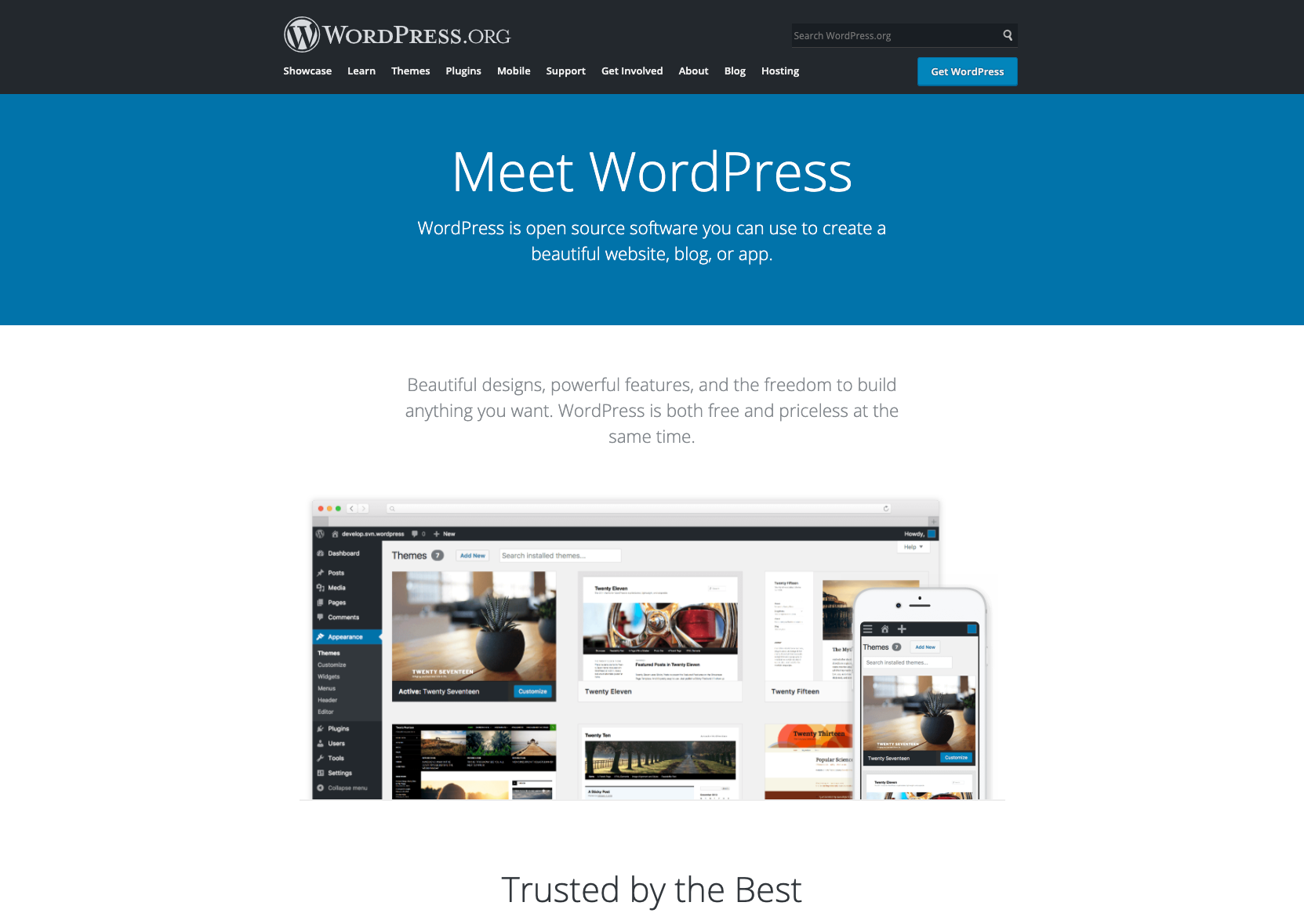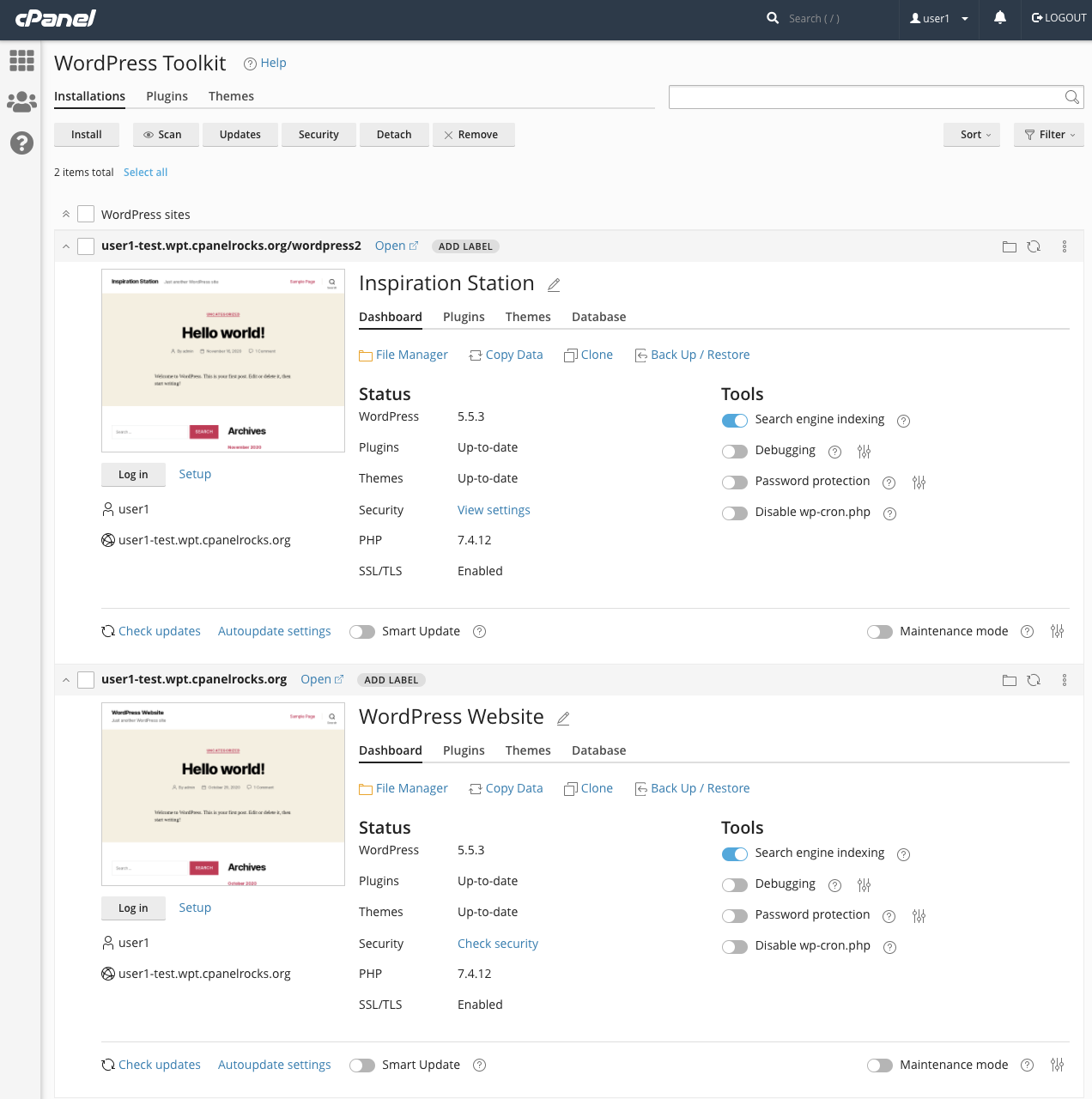In 2021, consumers will rely even more on the web and social media to solve problems and buy products. If a business isn’t on the web, it’s basically invisible. But what’s the best way to build and manage your business site or store? For hundreds of thousands of people, the answer to that question is WordPress.
WordPress is fundamentally a content management system (CMS), a web application that makes it easy to write and publish content online. WordPress is by far the most widely-used CMS. As of this writing, it is the foundation of 40 percent of all websites and 64 percent of sites that use a CMS, including the cPanel blog.
That’s not to say WordPress is the only option for building a business site or even the best option in every case. There’s a lot of competition from content management systems such as Joomla and Drupal, hosted platforms such as Squarespace® and Wix, and static site generators such as Gatsby and Hugo.
Each one is excellent in some scenarios for some users, but WordPress has risen to immense popularity because it hits the sweet spot for a wide range of business hosting contexts.
Businesses use WordPress to build:
- Marketing and lead-generation websites
- Blogs
- Portfolios
- Ecommerce stores
- Knowledgebases
- Customer support sites
- Media hosting sites
As we move into the top 5 reasons to choose WordPress for your business, let’s clarify exactly what we’re talking about. There are two main ways to use WordPress, as a self-hosted CMS (WordPress.org) and via a hosted SaaS platform (WordPress.com). We’re focused on self-hosted WordPress: businesses take the WordPress software and host it on a server or WordPress hosting account under their control.

WordPress is Free and Open Source
WordPress is an open-source content management system. It’s developed by a project that anyone can contribute to. The code can be inspected and changed to suit individual users. And it’s free; you can download WordPress and install it on a server without paying a cent.
We’ve got nothing against paying for software. Some of the best software in the world uses a paid licensing model because it’s the best way to provide high-quality tools and support to customers. However, there are advantages to using open-source software in your business.
Because WordPress is open-source, businesses are free to use it in any way they like, which gives them complete control over their site. It can be extended, modified, and customized to suit their use-case. It isn’t tied to a particular vendor, so they are free to host their site wherever they want and move it when they want. You can trust that your WordPress site will be usable for many years to come because you control the code.
WordPress Hosting is Under Your Control
WordPress is simple and inexpensive to host. It needs a server with PHP, a MySQL database, and a connection to the internet. That means you can host WordPress on anything from a low-cost shared hosting account to a virtual private server to a dedicated server or even a cluster of servers for the largest sites.
Because WordPress doesn’t have special requirements and depends only on easily available software and hardware, users are free to choose any WordPress hosting provider and move between providers at will. That’s not true of many SaaS alternatives where close integration between the software and hardware makes it challenging and expensive to migrate.
WordPress is Adaptable and Extensible
The theme and plugin ecosystem is one of WordPress’s biggest strengths. Plugins empower users to customize and add features to their site, from small conveniences to transformative add-ons like the WooCommerce plugin, which turns WordPress into a powerful ecommerce platform. Developers have created tens of thousands of plugins, both free and premium.
Themes determine WordPress’s appearance and influence the user experience. Do you want to build a store, a portfolio, a blog, or a marketing site? Do you like minimalism, bold colors and typography, or a design dominated by full-bleed images? Changing a site’s look is as easy as installing a different theme. There are thousands of free themes and an enormous variety of premium themes to choose from. If you want something unique, you can make your own or hire someone to do it for you.
WordPress’s extensibility goes beyond themes and plugins. It also features a comprehensive REST API to integrate third-party tools and “remote control” the CMS. We wrote about the WordPress REST API in How To Use WordPress as a Headless CMS
WordPress Support and Tooling are Widely Available
Because WordPress is so popular, businesses have no trouble finding documentation, support staff, or developers to help them build and look after their site. The project prioritizes user-friendliness, so day-to-day site operations don’t require in-depth technical knowledge. The official documentation and masses of free online support content may well be all you need.
However, if you would like help from an outside expert, WordPress professionals are easy to find and relatively inexpensive to hire compared to professionals who work with other content management systems.
Widespread integration support is another side effect of WordPress’s ubiquity. Your web management, customer relationship management, marketing, communication, and content production tools almost certainly offer WordPress integration, either natively or via a plugin.
For example, our very own WordPress Toolkit is a comprehensive management interface that simplifies the installation and maintenance of multiple WordPress sites. Learn more in The Evolution of WordPress Management with cPanel.

WordPress is Accessible
Accessibility and inclusivity should be a top priority for any business site. Sites that don’t prioritize accessibility risk excluding millions of people with vision and mobility impairments. The WordPress project enforces accessibility standards to ensure that it conforms to WCAG 2.1 guidelines at level AA.
In practical terms, that means WordPress is keyboard accessible and navigable, accessible to screen reader users, and maximizes the visibility of on-screen components. Third-party plugins and themes may not be built with the same care, but WordPress itself provides a solid foundation for a business site that meets the needs of all your customers.
Is WordPress the Right Choice for Your Business?
As we said at the beginning of this article, WordPress is far from being the only choice when building a business website. It’s worth taking the time to explore all of the options available to you. However, if you are looking for a flexible, extensible, and accessible content management system that can scale from solopreneur to multinational corporation, you won’t regret choosing WordPress.
As always, if you have any feedback or comments, please let us know. We are here to help in the best ways we can. You’ll find us on Discord, the cPanel forums, and Reddit. Be sure to also follow us on Facebook, Instagram, and Twitter.




